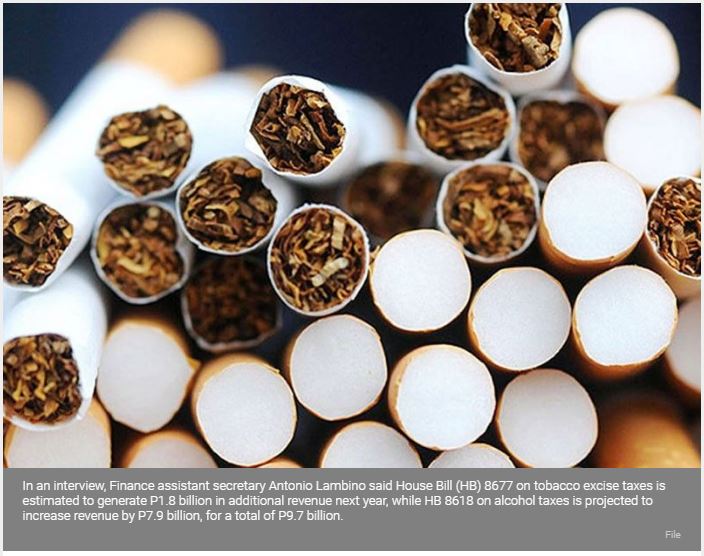Philippines: ‘Higher sin taxes not enough to fund health program’
MANILA, Philippines — The additional revenue to be generated by two House-approved bills that seek to increase tobacco and alcohol excise taxes may not be enough to bridge the P40-billion funding gap for the government’s universal health care (UHC) program, the Department of Finance (DOF) said.
In an interview, Finance assistant secretary Antonio Lambino said House Bill (HB) 8677 on tobacco excise taxes is estimated to generate P1.8 billion in additional revenue next year, while HB 8618 on alcohol taxes is projected to increase revenue by P7.9 billion, for a total of P9.7 billion.
This, Lambino said, is significantly lower than the P30.1 billion projected revenue under Senate Bill 1599 authored by Senator Manny
Pacquiao for tobacco sin taxes and the P32.3 billion incremental revenues under the original DOF proposal for alcohol.
The DOF is supporting the Pacquao version, which seeks to increase cigarette excise tax to P60 per pack.
Lambino said the P9.7 billion additional revenue also corresponds to only about 25 percent of the P40 billion financing gap for the Universal Health Care program in 2019.
“The financing gap should be covered by alcohol and tobacco (sin tax). My understanding is the financing gap will be bridged if we go with the Pacquiao version of P60 per pack (for tobacco) and if we are able to bring up the revenue from the alcohol side. The bill that came out of the House was around 25 percent of what we were targeting,” Lambino told the STAR.
The Senate and the House of Representatives last ratified week the Universal Health Care Bill, which seeks to cover all Filipinos with health insurance while upgrading the government’s medical facilities.
Under the bill, the UHC will get its funding from the incremental collections from the Sin Tax Law, 50 percent of the national government share from the income of the Philippine Amusement and Gaming Corp., 40 percent of the Charity Fund from the Philippine Charity Sweepstakes Office, as well as contributions from the Philippine Health Insurance. Corp. and appropriations for the Department of Health (DOH).
Health Secretary Francisco Duque said earlier the Universal Health Care program would need a total funding requirement of P257 billion for next year, but was only appropriated P217 billion under the proposed 2019 budget.
On the other hand, House Bill 8677 aims to raise the tax imposed on cigarettes to P37.50 per pack by July 2019 from the current P32.50 rate.
This would increase further by P2.50 per pack each year from 2020 to 2022, and by another four percent every year thereafter.
HB 8618, meanwhile, seeks to hike the tax on beer and other fermented liquors from the current P23.50 per liter to P28 per liter starting in January, to P32 in 2020, P34 in 2021 and P36 in 2022.
Beginning Jan. 1, 2023, this would increase further by seven percent every year.
Distilled spirits would be levied an ad valorem tax of 22 percent of net retail price and a specific tax of P30 per proof liter next year.
The specific tax would be increased to P35 in 2020, P40 in 2021 and P45 in 2022, and by seven percent every year starting in 2023. The ad valorem tax would remain constant at 22 percent.
For wines, the ad valorem levy would be 15 percent of net retail price and the specific tax would be P650 per proof liter in 2019. The tax would increase by seven percent every year starting in 2020.
Source: https://www.philstar.com/business/2018/12/17/1877546/higher-sin-taxes-not-enough-fund-health-program#q29hDUFQ3DwhFbR4.99


 Thailand
Thailand




